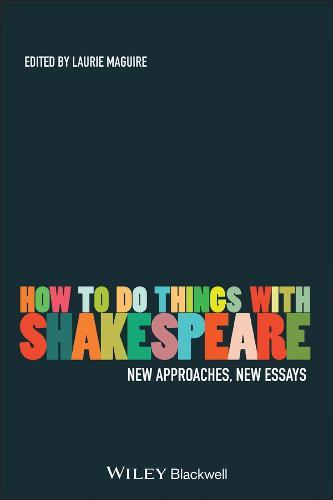Overview
HOW TO DO THINGS WITH SHAKESPEARE HOW TO DO THINGS WITH SHAKESPEARE “This is a companion to Shakespeare with a difference. Vive la différance!” DAVID BEVINGTON, UNIVERSITY OF CHICAGO “Doing things with literature: scholarly articles are not the only way to go. Aristotle uses a lecture, Horace a letter, Sidney a mock oration. Laurie Maguire and the contributors to this book engage in a genial conversation that invites students in. Like all good conversations, this one admits first-person candor, keeps things lively by changing the subject five times, welcomes disagreements, and waits for what the reader-listener is going to do in response.” BRUCE SMITH, UNIVERSITY OF SOUTHERN CALIFORNIA, LOS ANGELES
Full Product Details
Author: Laurie Maguire (Magdalen College, Oxford)
Publisher: John Wiley and Sons Ltd
Imprint: Wiley-Blackwell
Dimensions:
Width: 15.50cm
, Height: 2.00cm
, Length: 23.10cm
Weight: 0.472kg
ISBN: 9781405135276
ISBN 10: 1405135271
Pages: 320
Publication Date: 17 September 2007
Audience:
Professional and scholarly
,
Professional & Vocational
Format: Paperback
Publisher's Status: Active
Availability: Out of stock 
The supplier is temporarily out of stock of this item. It will be ordered for you on backorder and shipped when it becomes available.
Table of Contents
Notes on Contributors. Introduction: Laurie E. Maguire (Magdalen College, University of Oxford). Part I How To Do Things with Sources. 1. French Connections: The Je-Ne-Sais-Quoi in Montaigne and Shakespeare: Richard Scholar (Oriel College, Oxford). 2. Romancing the Greeks: Cymbeline’s Genres and Models: Tanya Pollard (Brooklyn College, City University of New York). 3. How the Renaissance (Mis)Used Sources: The Art of Misquotation: Julie Maxwell (Lucy Cavendish College, Cambridge). Part II How To Do Things with History. 4. Henry VIII, or All is True: Shakespeare’s “Favorite” Play: Chris R. Kyle (Syracuse University). 5. Catholicism and Conversion in Love’s Labour’s Lost: Gillian Woods (Wadham College, Oxford). Part III How To Do Things with Texts. 6. Watching as Reading: The Audience and Written Text in Shakespeare’s Playhouse: Tiffany Stern (University College, Oxford). 7. What Do Editors Do and Why Does It Matter?: Anthony B. Dawson (University of British Columbia). Part IV How To Do Things with Animals. 8. “The dog is himself”: Humans, Animals, and Self-Control in The Two Gentlemen of Verona: Erica Fudge. (Middlesex University). 9. Sheepishness in The Winter’s Tale: Paul Yachnin (McGill University). Part V How To Do Things with Posterity. 10. Time and the Nature of Sequence in Shakespeare’s Sonnets: “In sequent toil all forwards do contend”: Georgia Brown (independent scholar). 11. Canons and Cultures: Is Shakespeare Universal? : A. E. B. Coldiron (Florida State University). 12. “Freezing the Snowman”: (How) Can We Do Performance Criticism?: Emma Smith (Hertford College, Oxford). Index
Reviews
Maguire ... does not seek to force the essays into convenient (and conventional) critical boxes. Rather, she asks her contributors to open their essays with discussions of the questions and contexts that drove them to pursue their topic and then write about it. Highly recommended. (Choice Reviews, October 2008)
“Maguire … does not seek to force the essays into convenient (and conventional) critical boxes. Rather, she asks her contributors to open their essays with discussions of the questions and contexts that drove them to pursue their topic and then write about it. Highly recommended.” (Choice Reviews, October 2008)
Author Information
Laurie Maguire is a Fellow of Magdalen College and Reader in English at Oxford University. Her books include Shakespearean Suspect Texts (1996), Studying Shakespeare (2004), Where There?s a Will There?s a Way (2006), and Shakespeare?s Names (2007). Maguire has published widely on Renaissance drama, textual problems, performance, and women's studies.
Tab Content 6
Author Website:
Customer Reviews
Recent Reviews
No review item found!
Add your own review!
Countries Available
All regions
|




